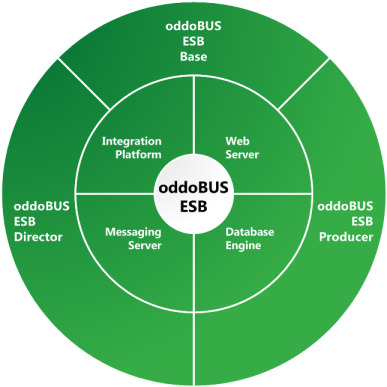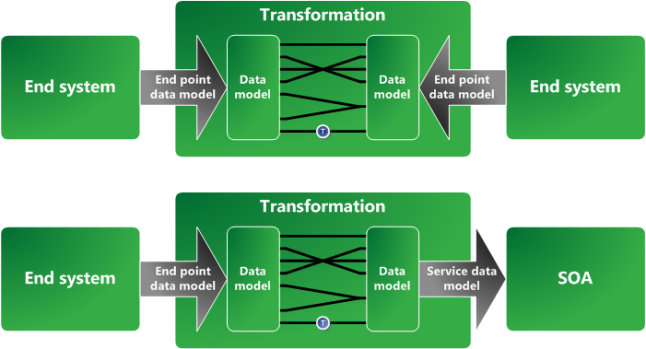
oddoBUS
oddoBUS components
oddoBUS solution consists of the following key components:
- oddoBUS ESB Producer
- oddoBUS ESB Director
- oddoBUS ESB Base.
These components build up on the standard functionality and use the following solutions by various vendors of your choice:
- Integration platform
- Messaging server
- Web server
- Database engine.

Figure 5 oddoBUS components
oddoBUS ESB Producer is a web application that enhances the strength of provisioning capabilities of underlying integration platform and messaging server, providing to the developers a set of tools for the full integration process, leading them from the functional requirements to the technical implementation in accordance with a special integration development process and built-in framework. oddoBUS ESB Producer supports this by numerous out-of-the-box features including:
- Deployment wizards – end to end integration wizards for deployment of services without the need of development knowledge for the underlying technologies
- Standard services – set of predefined services for the integration of various ISV’s solutions
- Data services – customizable services that perform common data transformation processes such as data mapping or composition/decomposition of large files
- Configuration management system – configurations, sources and documentation versioning, and restoration points of the complete ESB platform.
oddoBUS ESB Director is a web application providing complete overview of the ESB platform in all phases and lifecycles of a service or the overall platform. oddoBUS ESB Director differentiates users based on their area of responsibility, offering to various users different layouts and functionality adapted to their needs. Application is designed to be used by key business users, operations department and developers, providing full monitoring and interaction features including:
- Business process monitoring – detailed execution tracing of all business processes that are part of the ESB platform
- Human interaction within the processes – solution for manual actions, such as approvals
- Runtime management – management of deployed and running processes, exceptions and triggering
- Transport management – management of all communication channels and routing definitions
- Technical process monitoring – detailed execution tracing of all technical processes that are part of the ESB platform
- User management – ESB application and platform access management
- Service repository – directory of all services deployed on the platform, and related documentation
oddoBUS ESB Base is the core database component used by oddoBUS ESB Director and oddoBUS ESB Producer. Both applications use the oddoBUS ESB Base for storing all data and configurations, as well as for source code, processes and platform versioning. Database component offers all functionalities through APIs, with auditing of changes on all levels of access and all data.
oddoBUS ESB Director is hosted on Apache Tomcat server. Application enables users from various departments to perform various tasks related to ESB integration, including:
- Monitoring of business and technical processes
- Business processes monitoring
- Graphical representation of business processes’ flows
- Technical process monitoring
- Detailed logging of each executed technical process for the purpose of comprehensive analysis of the process flow
- Business processes monitoring
- Manual interaction as part of some business processes (e.g. approval/rejection, confirmation that parts of the business process outside of oddoBUS® ESB solution are done etc.)
- Runtime Management
- Processes management
- Monitoring and management of all processes running on the integration platform. Process environment (maximum memory consumption, thread count limits, fault tolerance, load balancing) and process’ status changes (process recovery) can be controlled and defined.
- Exception management
- Resolution of exceptions occurring during runtime of the oddoBUS® ESB solution through recalling of services and service calls’ abortion.
- Triggering management
- Customization of processes automatic triggering.
- Processes management
- Transport management
- Messaging management
- Monitoring and management capabilities for the messaging server and all communication channels: point-to-point (queues) and publish and subscribe (topics).
- Routing management
- Routing component is a part of all services running on the integration platform.
- Routing can be reconfigured during the runtime of the service as well (adding/changing processes within the service flow).
- Messaging management
- User management
- Possibility to define user groups and roles for access management for both integration platform access (services running on the integration platform) and oddoBUS® ESB Director access
- Main distribution of roles is divided according to the personnel in charge of the various parts of oddoBUS® ESB solution, i.e. developers, operations personnel and business users
- Service repository
- Directory of all services deployed on the platform
- It can be used also as a testing facility for invocation of services
- Platform administration:
- Logging management:
- Turning on/off of extensive logging for any process
- Archiving (automatic or manual)
- Deletion (automatic or manual)
- Additional notifications customization (e.g. sending of e-mails, sending of SMSs, integration with existing monitoring or workflow solutions such as HP OpenView etc.) – subject to availability of such infrastructure.
- Logging management:
oddoBUS ESB Producer
oddoBUS ESB Producer is a web-based application hosted on Apache Tomcat server. Application enables developers to perform various tasks related to ESB integration development, using:
- Process templates and wizards
- Wizards for creating services on ESB for various API functionalities on the legacy systems that support the following technologies:
- JDBC for database stored procedures
- SOAP over HTTP or JMS
- SAP R/3 IDOC and RFC BAPI
- Support for Java API calls
- Visual data model transformation tool
- Visual tools for rapid end-to-end data transformations
- Testing facility for simulation of defined transformations
- Wizards for creating services on ESB for various API functionalities on the legacy systems that support the following technologies:

Figure 6 oddoBUS transformation
- Standard services
- Data model independent services
- web services
- database services
- messaging services
- notification services
- file transfer services
- Standard services for SAP integration
- SAP FI
- SAP MM
- SAP SD
- SAP IS-T and other SAP Industry Solution platforms
- Data model independent services
- Connectors for common standard technologies including: HTTP/SOAP, JMS, Database Connectors (JDBC, ODBC), LDAP, FILE/(S)FTP, SAP R/3, TCP, SMTP, Corba
- Data services
- Data mapping service
- Used for mapping of data between the integrated systems and/or services
- Large files composition and decomposition service
- Used for breaking down large files (in xml or plain text formats) into smaller messages for the purpose of faster processing and performance stability. Service works the other way around as well, by composing processed messages into a large file.
- Data mapping service
- Toolkit services
- User management services
- Services for integrating user management into every process
- Optional integration of user management services from legacy identity management systems
- Optional integration with a legacy LDAP server
- Logging services
- Provide logging capabilities for the whole integration platform and all implemented processes
- Extensive logging is built-in in all standard and other toolkit services and connectors
- User management services
- Source code and customizations versioning.
oddoBUS ESB Base
- The standard oddoBUS ESB solution uses an Oracle database as database engine, for storing of all data related to the ESB implementation in all phases and lifecycles, including:
- Business and technical processes runtime data (e.g. logs)
- Source code
- User management data
- Connectivity data
- User preferences and customizations
- oddoBUS ESB Base is used by all components of oddoBUS ESB solution.
Messaging server
The standard oddoBUS ESB solution uses Apache ActiveMQ JMS server as its messaging server, but also other JMS server implementations can be used, including:
- TIBCO EMS®
- BEA Weblogic
- Websphere MQ
- OpenJMS.
Integration platform
The standard oddoBUS ESB solution uses Mule Open Source ESB as integration platform. Customization for other integration platforms can be done, including:
- TIBCO ActiveMatrix BusinessWorks™
- Microsoft® BizTalk® Server
Web server
The standard oddoBUS ESB solution uses Apache Tomcat web server for hosting oddoBUS ESB Director and oddoBUS ESB Producer web applications.
Database engine
The standard oddoBUS ESB solution uses Oracle 10g database for the deployment of oddoBUS ESB Base component. It is not required to have a separate database server or database instance, one database schema is sufficient.